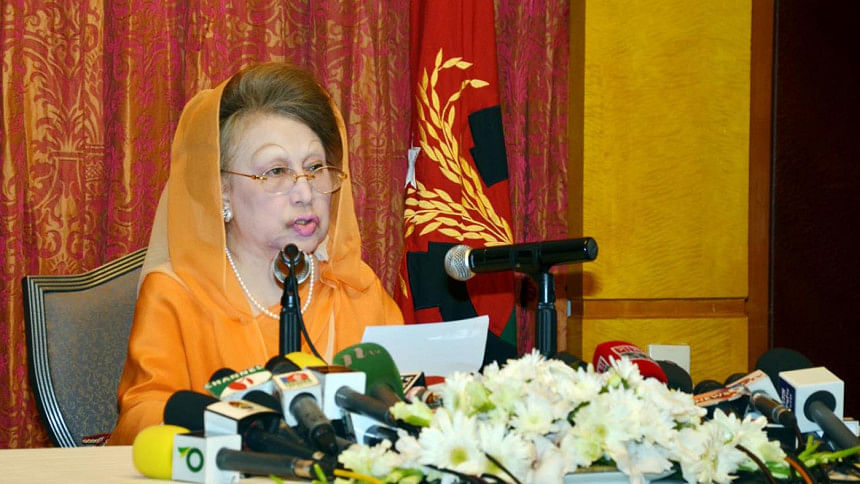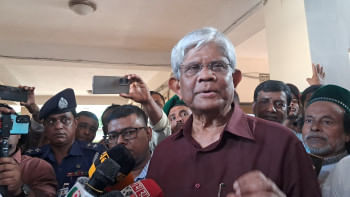Khaleda wants what she did not offer Hasina

Khaleda Zia's proposal for forming new Election Commission on the basis of consensus among political parties sounds good, but seems unrealistic in the current confrontational culture in politics.
The BNP chief took a few weeks to come up with a set of proposals including some for strengthening the EC. But ruling Awami League took no time to reject the proposals as a whole.
Immediately after Khaleda unveiled proposals at a press conference, AL General Secretary Obaidul Quader at another a press conference termed the proposals "hollow" and a "mockery" before the nation.
This is the political reality.
Also READ: Opinion: Powerless president now all-powerful?
The two major political parties were able to reach a consensus during anti-Ershad movement. Both parties were agitating to oust Ershad to restore democracy in the country. They were successful. Ershad was forced to step down on December 6, 1990. This paved the way for AL and BNP to return to the state power.
But, they could not forge any consensus on nationally important issue since the fall of the autocratic regime.
READ more: The cost of ignoring the Constitution
Even, restoration of parliamentary democracy through constitutional amendment in 1991 has not been possible easily. The then ruling BNP preferred to retain the presidential form of the government. The then main opposition AL threatened to wage street agitation to force the BNP to go for parliamentary democracy. Finally, the BNP agreed.
The same thing took place regarding introduction of the election time non-partisan caretaker government in 1996. The AL-led opposition parties through violent street agitations forced the then BNP-led government to introduce the non-partisan caretaker government system by amending the constitution.
Also READ: How other Saarc countries appoint EC
Therefore, it is very difficult to find any instance of consensus between the two archrival political parties. Moreover, the political rivalry has deepened over the years, emerging as political enmity.
Amid such a political situation, Khaleda on Friday unveiled the proposals for electoral reforms including the one for forming the EC on consensus among political parties.
She now expects her archrival Sheikh Hasina, also the prime minister, to do a favour for her BNP. But when she was in power, Khaleda did not offer any courtesy to Hasina when the latter placed the similar proposal in 2006 in parliament.
Under leadership of Hasina, the AL-led alliance first unveiled the electoral reform proposals in 2005 at a press conference.
Later in February 2006, Hasina placed the proposals in parliament. One of the proposals was to form the EC in consultation with all political parties.
The proposal was not honoured. The BNP-led government in May 2006 constituted the new EC by appointed Justice MA Aziz as the chief election commissioner and two other election commissioners.
At that time, the BNP-led government claimed that the constitution empowered the president to constitute the EC and any consultation with the political parties was not required.
The same constitutional provision still exists, empowering the president to constitute new EC in February after expiry of the tenure of the current EC-led by Kazi Rakibuddin Ahmed.
And Hasina can advise the president to appoint some individuals on the government's choice to appoint as CEC and other election commissioners to constitute the EC. There is no legal complication to this regard.
AL leaders have already made it clear that the president will constitute the EC exercising of his constitutional powers.
So, it will be her generosity, if Hasina advises the president to open dialogue with political parties seeking their opinions on the formation of the EC. If she does so, the BNP will get a favour.
The EC is now more important organisation than what it was in 2006. When Hasina proposed for forming the EC on consensus among political parties, the non-partisan election time government existed then. The EC conducted the parliamentary elections under the non-partisan government.
But the situation has been changed since abolishing the caretaker government in 2011. AL will be in power during the next parliamentary election and the role of the EC will be more crucial to ensure a free and fair parliamentary election.
Burring past acrimony, the government should come forward to ensure constitution of an EC free from controversy. If the EC is mired into controversy since its formation, it may be difficult for it to restore people's confidence in the constitutional body.
The opposition's voice should be heard. Their proposals should be considered. Any other organisation may come up with proposals for electoral reforms to strengthen the EC. All the efforts should be aimed at holding a free and fair election.
If a congenial atmosphere is created, people will feel safe and enthusiastic to exercise their political rights to vote. A free and fair election can contribute much to consolidating the democracy in the country. Similarly, a controversial general election may appear disastrous for democracy.
As the government wants to ensure that the next parliamentary election is held in a free and fair manner, it should not outright reject Khaleda's proposals for electoral reforms. There are some good proposals which need to be discussed.

 For all latest news, follow The Daily Star's Google News channel.
For all latest news, follow The Daily Star's Google News channel. 






Comments